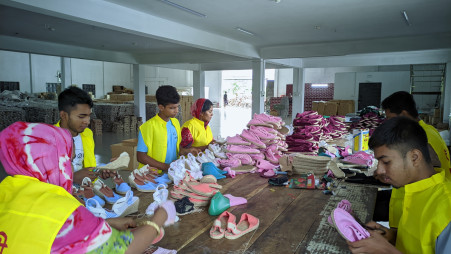[ad_1]
Despite a high price of jute yarn and strong competition in the international market, a few companies in the country are earning millions from manufacturing espadrilles. Made from jute and mostly hand assembled, these summer shoes are exported to multiple countries in the world
Espadrilles made in Amass’ Jhenidah factory are going to Spain, Italy, France, Germany, Denmark, South Africa and Korea. Photos: Courtesy
“>

Espadrilles made in Amass’ Jhenidah factory are going to Spain, Italy, France, Germany, Denmark, South Africa and Korea. Photos: Courtesy
Efforts to revive the ‘golden fibre’ of Bangladesh, jute, has been frustrating for the last few decades. The closure of state-owned jute mills, farmers being deprived of fair prices for raw jute, aggressive growth of plastic have all dealt a blow to the country’s major cash crop.
Yet, there are some who are finding ways to utilise this gift of nature which grows so well in the country, and is adored worldwide for its biodegradability and nature-friendliness.
Espadrilles factories are one of those entities. These companies manufacture espadrilles out of jute and export them to a number of countries in the West.
Photo: Courtesy
“>

Photo: Courtesy
Espadrilles are a type of shoe that has a lightweight, braided sole made of a natural fibre such as jute or grass. These are basically summer footwear, with strong historical ties to some regions in southern Europe.
There are a couple of espadrilles manufacturers in Bangladesh; among them are Tropical Shoe Industries Limited, Cotheeka Jute Industry, Phulhar Footwear Limited, Amass Footwear Ltd, Golden Braid Footwear Ltd etc.
To understand the business case for jute-made footwear, we talked to the founder of Amass Footwear Ltd.
Photo: Courtesy
“>

Photo: Courtesy
Amass Footwear had a humble beginning in 2017. The same year, the first batch of espadrilles was exported.
“We founded Amass Footwear with an investment of only Tk10 lakh, and the factory was set up on my own land in Jhenidah,” Obaidul Haque Rasel, the managing director of Amass told The Business Standard.
“We are a hundred-percent export oriented jute-made shoe company. We don’t sell in the local market. Our products are going to Spain, Italy, France, Germany, Denmark, South Africa and Korea,” Rasel added.
Photo: Courtesy
“>

Photo: Courtesy
Some products have also been exported to the US, but Rasel said they are yet to gain a strong foothold in the US market.
Espadrilles are mostly hand-made. Amass Footwear engages workers, most of whom are women, in two ways: some work at the factory, and others work from home.
The sole and the upper part of the shoe, made out of leather or fabric, is made in the factory, and the parts are then sent to the workers’ homes.
Photo: Courtesy
“>

Photo: Courtesy
Those who work from home have prior training from Amass, and they do the sewing job – joining the two parts of the shoe.
“Of course, there are some buyers who want the shoes to be made inside the factory so compliance can be monitored. In these cases, we make the whole shoe inside the factory,” Rasel said.
For other buyers who do not have this requirement, the product is completed at home.
“There are women who would not work in the factory for personal and family reasons, so we send the materials to their homes and they do the work in their free time,” Rasel explained.
There are 700 to 800 work-from-home employees in Amass, while there are around 100 skilled workers who work inside the factory.
Photo: Courtesy
“>

Photo: Courtesy
Rasel informed that Amass Footwear is a compliant company with all sorts of certifications and licences.
Amass Footwear is not the first of its kind in the country. Rasel came across the idea in Cumilla when he was a college student. He saw a small factory there that made these shoes in workers’ homes. He took an immense interest in the industry and decided to set up a factory some day.
In 2013, he started a business of garment accessories. As the business grew, it was time for him to chase his dream. In 2016, he registered the footwear business and started operations the following year.
Last year, Amass Footwear exported products worth $1million.
Yet, Rasel says it is just a portion of Amass Footwear’s annual capacity.
“Due to low order, we can only use 25% to 40% of our production capacity,” Rasel said, adding, “espadrilles are summer shoes, these are not used as widely as RMG, or regular shoes. It’s a culture-specific product.”
Photo: Courtesy
“>

Photo: Courtesy
Strange things are happening in the jute sector. Although jute products have some level of popularity in the West, jute farmers in the country are discouraged from cultivating jute due to low prices. At the same time, Bangladesh is losing the international jute product market to India due to poor branding and marketing.
“We cannot buy jute directly from the farmers, we buy jute yarn from traders. While farmers often do not get fair prices for the raw material, we have to purchase yarn at a high price,” Rasel said.
“In the West, jute products are all assumed to be made in India. Our jute is exported to India, with which they are making espadrilles and exporting to the western market,” added Rasel.
[ad_2]
Source link
